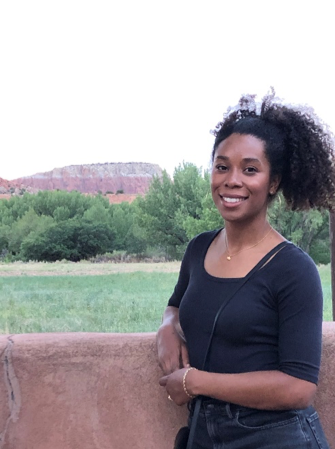Desiree Loggins
 Desiree, originally from Sacramento, CA, defines a naturalist is someone who has a deep and meaningful relationship to land that notices the changes in the system through time. They do not necessarily need to name anything, but they have an intimate enough relationship with the place to know how things are interacting and progressing. Although Desiree was always interested in the natural world, her interests really sparked when she started as a student worker at Younger Lagoon Reserve doing coastal prairie restoration. There she learned about plants and became more familiar with the land she was working on and as that continued, she gradually became more interested in other taxa, like birds. Desiree previously worked for the Audubon Society and is now a graduate student at the Geography Department at University of New Mexico and studies bird ecology. In Santa Cruz, having a hand and participating in land stewardship was especially inspirational for Desiree. She particularly enjoyed observing how each person interacted and had a bond with their environment in a different way.
Desiree, originally from Sacramento, CA, defines a naturalist is someone who has a deep and meaningful relationship to land that notices the changes in the system through time. They do not necessarily need to name anything, but they have an intimate enough relationship with the place to know how things are interacting and progressing. Although Desiree was always interested in the natural world, her interests really sparked when she started as a student worker at Younger Lagoon Reserve doing coastal prairie restoration. There she learned about plants and became more familiar with the land she was working on and as that continued, she gradually became more interested in other taxa, like birds. Desiree previously worked for the Audubon Society and is now a graduate student at the Geography Department at University of New Mexico and studies bird ecology. In Santa Cruz, having a hand and participating in land stewardship was especially inspirational for Desiree. She particularly enjoyed observing how each person interacted and had a bond with their environment in a different way.
Desiree thinks diverse recruitment of naturalists is hampered by the mainstream white dominant environmental movement. In this paradigm you have to be an expert and fit a very specific mold, and if you cannot identify everything by their Latin and common names, or you cannot venture into the “wilderness” on your own, you are not a naturalist. This in turn devalues naturalists in cities that may be participating in their back yard or in areas that are not conventionally thought as “nature.” From experience, Desiree has found, there are not many great ways to recruit new diverse people without making big institutional changes, because the structural issues are still in place. What she sees to be most effective is to let underrepresented people lead, especially if you are trying to reach a particular audience – but be careful to not devalue ideas and tokenize individuals. For example, if you have black folks, queer folks, or indigenous folks, creating leading and designing projects, they are going to know what their community needs, what their struggles are and how to better engage them.
Most of these conversations are not new but have been brought to the forefront and accelerated because of current political issues – it that sense it is important to continue this work even when it is not in popular news. For many marginalized folks, it can be emotionally tolling to have to continuously share your experiences and defend it to those that may not fully understand them. As such, it is important to create actionable steps and not just discuss issues and potential solutions.
